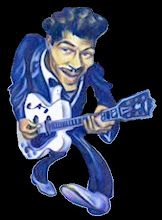
I've only seen a couple of biopics in which the lead actor was so able to meld their own personality with the subject they were portraying, they made it hard for me to see where one person ended and the other began. This was the case with Sissy Spacek in Coal Miner's Daughter, Gary Busey in The Buddy Holly Story, and adding to the list is Joaquin Phoenix in Walk The Line.

Walk The Line starts with Johnny Cash (Joaquin Phoenix) preparing to go on stage at Folsom Prison. When Johnny sees a table saw, it reminds him of the death of his older brother Jack and the movie flashes back to that traumatic event in 1944. The film then moves Johnny into adulthood with his service in the Air Force, where at an on-base showing of a documentary about Folsom Prison, Johnny gets the idea for one of his most famous songs, "Folsom Prison Blues".

Johnny returns to the United States, gets married, and has a very unsuccessful career as a door to door salesman. He forms a gospel band on the side, and when they finally get a chance to record at Sun Studios, things are a bust when they sing Sam Phillips a gospel song. Johnny mentions that he has a song he wrote and when he plays it for Phillips....as the old saying goes "it's history in the making".

During his early years we see Johnny on tour with Jerry Lee Lewis, Roy Orbison, and even the king himself, Elvis Presley. [A side note: Waylon Payne plays Jerry Lee in this film, the last time I saw Waylon Payne he was playing Hank Garland in Crazy....I kept thinking I was watching Waylon Payne playing Hank Garland playing Jerry Lee Lewis]. On one of these tours, Johnny's path crosses with June Carter's (Reese Witherspoon) and he is smitten from the start. Too bad for Johnny, because June won't have anything to do with a married man. Also, on these tours we see Johnny getting hooked on pills, explaining why he always wears black (Johnny: "Couldn't Find Anything Else") and where he came up with his sound (Johnny: "We'd play faster if we could"). Walk The Line continues showing us parts of Johnny Cash's life back up to his performance at Folsom Prison.

Other musicians of note in Walk The Line: Shooter Jennings has a couple of brief appearances playing his own dad, Waylon Jennings. Sandra Ellis Lafferty, as Mother Maybelle Carter, has a great scene when the family is trying to get Johnny off drugs and she chases a drug dealer away with a shotgun. Shelby Lynne plays a very convincing role as Johnny's mother in the early part of the movie.

One final small thing to look for in Walk the Line, right before Johnny decides to play Folsom and record a live album there (even though the record company didn't think it was a good idea) he's looking through a box of prisoners' letters. If you look closely, one of them is from Folsom prisoner Glen Sherley. This is the man who wrote Johnny's song "Greystone Chapel" about the chapel at Folsom Prison.











That's a very interesting bit of trivia about Glen Sherley. Great post about a great film!
ReplyDeleteI think most people probably missed the Glen Sherley reference, since it was only on screen for a very, very brief time and sort of an obscure thing to include in the first place....but I guess that shows how much care went into the making of Walk The Line.
ReplyDeleteThis is a decent movie, but I have to disagree with you about Joaquin Phoenix's portrayal of Johnny Cash. He does a fine job in all scenes except when he is performing onstage. He apes Johnny's stage mannerisms and , in my opinion, goes over top. He comes close to being a parody of Cash rather than presenting him in a realistic way. I think he is quite good as Cash in all other scenes.
ReplyDeleteI enjoyed this movie but I found Joaquin Phoenix 's aping of Cash's onstage mannerisms to be over the top and turned the performance scenes into a parody of Cash's stage act.
ReplyDeleteHe was very convincing in all the other scenes, but when he was onstage performing as Cash, I just couldn't buy it.